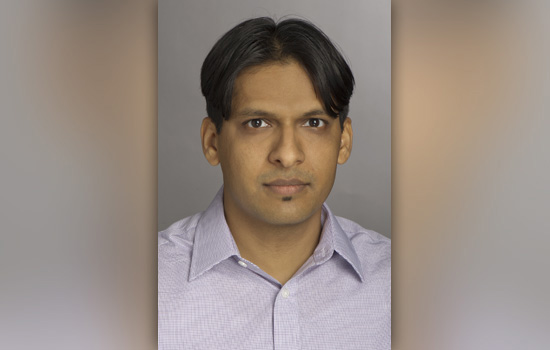Physicist earns distinguished NSF CAREER award
Mishkat Bhattacharya will use grant to enhance optics of rotation-sensing technologies
RIT Production Services
Mishkat Bhattacharya
Mishkat Bhattacharya, assistant professor of physics in Rochester Institute of Technology’s College of Science, has received the Faculty Early Career Development (CAREER) Program Award from the National Science Foundation. Bhattacharya will use the grant funding to examine the continuing demand for better optical sensing of mechanical rotation devices used in fields such as nanoscience, precision measurement, remote sensing and quantum computing.
The CAREER Program is an NSF-wide activity that supports junior faculty who exemplify the role of teacher-scholars through outstanding research, excellent education and the integration of education and research within the context of the mission of their organizations. Such activities, the foundation states, build a firm foundation for a lifetime of leadership in integrating education and research.
Bhattacharya will use the nearly $450,000 award over the next five years to support his research to develop techniques for measuring mechanical rotation at the quantum level, while identifying and circumventing the limits placed by quantum mechanics on sensor capabilities. Bhattacharya said his research will have a technological impact on society by taking rotation- sensor technology to its limits, and cited that examples of machines that exploit rotation sensing include cell phones, gyroscopes on ships and airplanes, and global positioning system satellites.
“The study of rotation is very important—since rotation is what makes the world go ’round,” quipped Bhattacharya. “In fact, society today relies critically on technologies that sense mechanical rotation. The proposed research is designed to investigate situations where these rotation-sensing technologies come up against limits posed by quantum physics. Such studies are expected to yield strategies for overcoming these limits and thus improving our ability to measure mechanical rotation. I would also like to acknowledge the critical role played by a seed grant from the Research Corporation for Science Advancement in supporting my earlier work on rotation sensing.”
Bhattacharya’s research will also be incorporated into a comprehensive education plan. In addition to public outreach events displaying a variety of rotational toys at Imagine RIT: Innovation and Creativity Festival and “Science Saturdays” at the Rochester Museum & Science Center, the project includes collaborative visits for students to the Indian Institute of Technology, Kanpur, and provides an introduction to the orbital angular momentum of light at the Quantum Optics Laboratory at RIT.
Bhattacharya’s research interests are in the areas of theoretical quantum electrodynamics, especially quantum optics and low temperature physics. His current work is centered in atomic physics, including laser cooling and trapping, spectroscopy and scattering theory; nanomechanics, especially quantum machines or the manipulation of small objects with singular optics, and light-matter interfaces; and superconductivity, in the context of quantum computation, optical interactions in superconductors, and detectors.
Prior to arriving at RIT in 2011, Bhattacharya earned his Bachelor of Technology degree in engineering physics from the Indian Institute of Technology, Mumbai, and his master’s and doctoral degrees in physics from the University of Rochester. He has held postdoctoral positions at the Georgia Institute of Technology, the University of Arizona, and the University of Maryland, College Park.
He is a member of the American Physical Society and the Optical Society of America and serves as a referee for several journals, including Physical Review Letters, American Journal of Physics, Optics Letters and the Journal of Physics A. In 1996, he received an American Association of Physics Teachers award and, in 2012, he received a Cottrell College Science Award. He is also the recipient of a nearly $490,000 grant from the Office of Naval Research to study the development of next-generation sensors for measuring linear displacements and forces.














